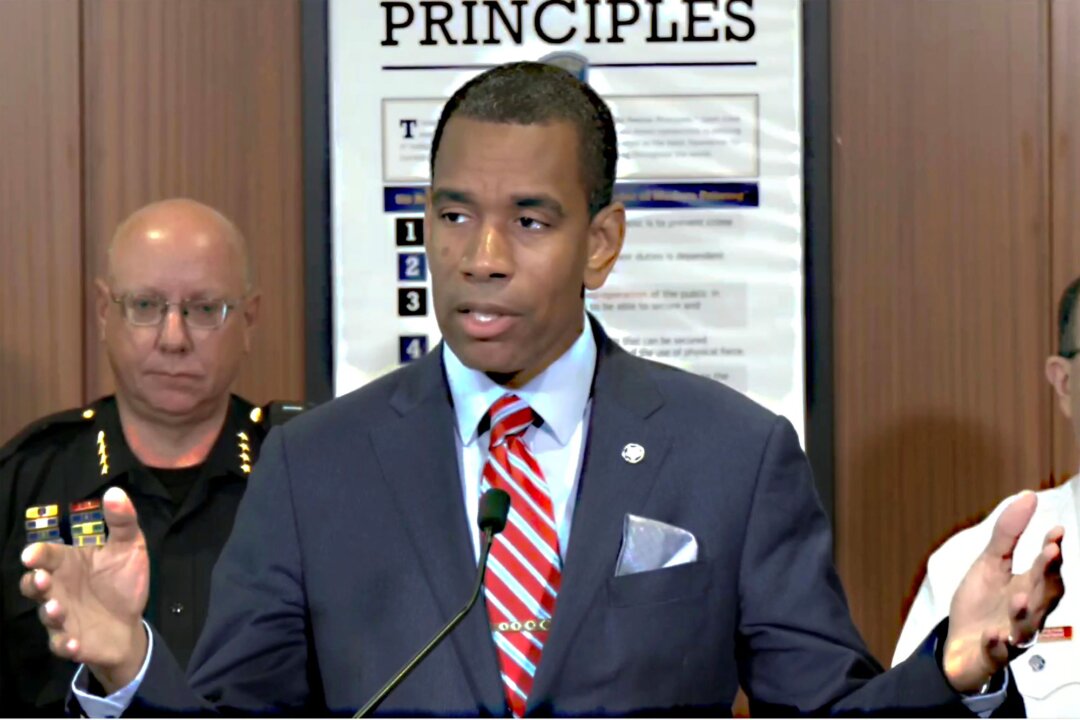The city called the lawsuit ‘political theater’ and accused the Trump administration of trying to ‘commandeer local resources.’
The Trump administration filed a lawsuit on April 24 alleging that the city of Rochester, New York, had violated the Constitution and federal law through multiple policies barring cooperation with federal immigration enforcement.
Filed in federal court, the lawsuit came a month after Rochester Mayor Malik Evans, at a press conference, accused local police of potentially violating city policy by responding to a request from the Department of Homeland Security on March 24. Evans said that immigration enforcement was a federal function and that local police do not assist in federal immigration enforcement.
The city, Evans, and City Council President Miguel Melendez Jr. responded by calling the lawsuit “an exercise in political theater, not legal practice.”
In a statement posted to the city’s website, they said that “the City fully intends to defend the legality of its policies, and to use this opportunity to hold the federal government to task and ensure that it does not commandeer local resources in violation of the Constitution’s Tenth Amendment.”
The Tenth Amendment generally reserves certain powers for states and says the “powers not delegated to the United States by the Constitution, nor prohibited by it to the States, are reserved to the States respectively, or to the people.”
The Trump administration has accused the city of violating the Supremacy Clause of the Constitution, which says states are bound by federal law. It pointed to a city council resolution and two policies from the Rochester police department restricting cooperation, including information sharing, with federal authorities.
Those policies, the lawsuit said, “violate the Supremacy Clause, interfere with federal law, and create obstacles to the enforcement of federal immigration law.” It pointed to federal law prohibiting restrictions on information sharing about an individual’s immigration status.
The Justice Department is asking for a federal judge to declare Rochester’s policies unconstitutional, as well as contrary to federal law and therefore invalid.
On the same day as the lawsuit, a federal judge preliminarily blocked the administration from cutting funding for cities that adopt so-called sanctuary policies. Trump had signed an executive order on Jan. 20 directing the attorney general and Secretary of Homeland Security to “evaluate and undertake any lawful actions to ensure that so-called ’sanctuary’ jurisdictions … do not receive access to Federal funds.”
U.S. District Judge William Orrick stated in an opinion that Trump’s attempt to withhold funding apportioned by Congress violated the nation’s separation of powers and the Spending Clause, which allows Congress to tax and spend revenues.
Like Evans, Orrick cited the Tenth Amendment and stated that freezing federal funding imposed “coercive condition intended to commandeer local officials into enforcing federal immigration practices and law.”
The Rochester lawsuit is the latest move by the Trump administration, which seeks to increase immigration enforcement.
Trump started his second term by declaring a national emergency at the southern border. In an executive order, he stated that American sovereignty was “under attack” and that an invasion had “caused widespread chaos and suffering in our country over the last 4 years.”
The Justice Department’s lawsuit said that the country’s efforts to face a “crisis of illegal immigration” were “hindered by Sanctuary Cities such as the City of Rochester, who refuse to cooperate or share information, even when requested, with federal immigration authorities.”
In February, the Justice Department announced it was suing the state of New York over its Green Light Law, which allows noncitizens to apply for driver’s licenses and prevents the Department of Motor Vehicles from sharing information with immigration enforcement.

